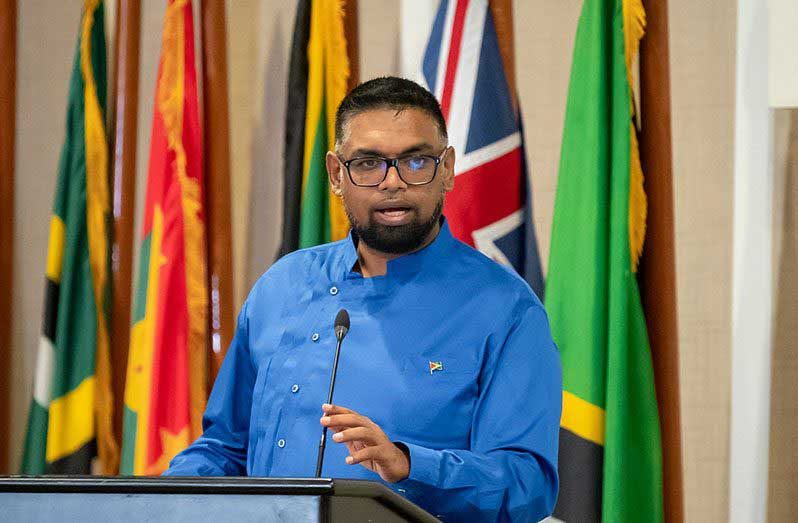—President Ali mulls plans for seamless, interactive learning, leveraging technology
PRESIDENT, Dr. Irfaan Ali has outlined an innovative approach to transforming education in Guyana, with hologram technology set to play a central role in teaching mathematics.
DURING a community engagement on Sunday, Dr Ali said: “We’re looking at the hologram technology to deliver mathematics, so that your children can walk up to a screen and ask an AI robot how to solve [an] equation.”
The interaction, he said, would be seamless and without the typical frustration some students may encounter in traditional learning environments.
Guyana is not just keeping up with global trends but is actively positioning itself as a leader in the field of education technology.
“That is where the world is going, and we are going ahead,” Dr Ali remarked confidently, stressing that his administration is prioritising strategies that will ensure that Guyanese children are equipped to thrive in the ever-evolving global economy.
The Head of State said: “We are busy strategising on the strategies that will enable us to be ahead of the competition, enable your children to function effectively in the new world.”
This is a part of a broader vision, as the government is pursuing ambitious plans to establish Guyana as a global education hub.
Dr. Ali said: “We are not just building an education hub to meet our national needs, we want children from around the world and the Caribbean to come to Guyana as an education destination, making it a part of the economic expansion of the country.”
Already, he noted, Guyana has begun discussions with major tech giants to explore areas for opportunities.
“We are now discussing with major tech giants on how we are going to convert the Institute of Applied Science and Technology, into a world innovation hub, where we will get startups to come here, to experiment here, to build the next generation of technology from Guyana with investment from the private sector,” the Head of State said.
He added: “That is the future we are talking about young people; this is exciting things.”
Guyana, he stressed, is not only preparing its youth for the future, but also positioning itself as a global player in the world of innovation and education.
Just last week, the Guyanese Head of State called on global leaders to use open AI and digital access to bridge the divide, while addressing the Spring 2025, Berkeley Innovation Forum, California, United States.
“AI must serve rather than replace humans. It must empower rather than exploit and uplift rather than marginalise. Only through such re-imagined vision where AI is directed towards the common good can we ensure the next era of globalisation is one of conversion not division,” President Ali firmly said.
As the President reflected on digital revolution throughout history, he had pointed out that “big data,” robotics and the internet are shaping economies at an unprecedented speed, concentrating technological power in a few hands.
“Today, as AI and automation redefine industries, there is growing backlash against globalisation, rising populism and increasing disparities between the developed and developing world,” the President noted.
In that regard, he said that in the late 20th century, globalisation was expected to narrow economic and technological gaps between developed and developing nations, through international trade, investment and technology transfer.
The digital revolution was also projected to democratise access to education and knowledge, fostering competitive knowledge economies in developing nations, he added.
Owing to the challenges of today, President Ali underscored that AI is poised to usher in a new era that could redefine human civilisation.
“It promises an era that will bring not just economic and political shifts, but also a profound rethinking of human purpose, but there are fears also, about whether AI will further consolidate power in the hands of high-tech corporations, making them more powerful and outside of the reach of governance,” he said.


.jpg)











